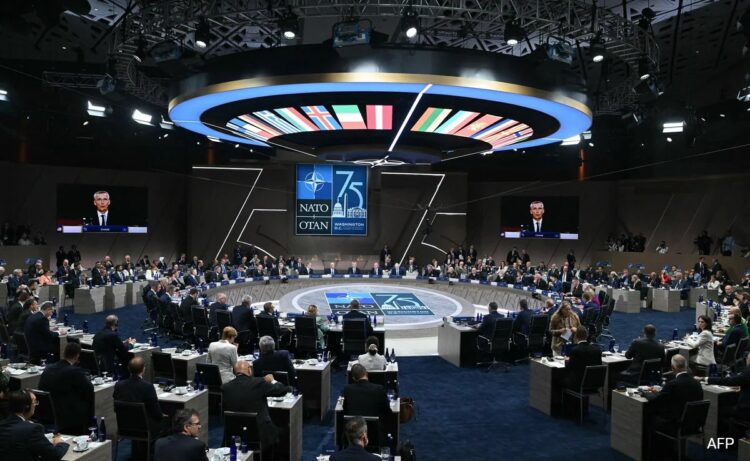On Wednesday, NATO allies announced the initiation of F-16 jet transfers to Ukraine and bolstered commitments to Kyiv regarding future membership in the alliance. This development comes during the 75th anniversary summit in the US capital, which is overshadowed by political uncertainties in the United States.
The three-day gathering, marked by ceremonial grandeur, sees President Joe Biden aiming to consolidate Western support while reassuring US voters about his capability to lead, amid pre-election scrutiny at the age of 81—six years older than the alliance itself.
Biden personally greeted the other 31 NATO leaders before urging them to match Russia’s accelerated military production, which has intensified since President Vladimir Putin’s invasion of Ukraine two years ago.
“We can—and will—defend every inch of NATO territory, and we’ll do it together,” Biden declared at the North Atlantic Council, NATO’s decision-making body, during a meeting in Washington’s convention center amidst a heat wave.
Biden also announced that Denmark and the Netherlands had started delivering US-made F-16 jets to Ukraine, fulfilling a key promise made last year to Kyiv, which has faced challenges in achieving air parity with Russia.
Furthermore, Biden revealed new air defense systems for Ukraine and disclosed an agreement to periodically station long-range missiles in Germany.
US Secretary of State Antony Blinken emphasized the significance of the F-16 transfer, stating it “focuses Vladimir Putin’s mind on the fact that he will not outlast Ukraine, he will not outlast us, and if he persists, the damage to Russia and its interests will only deepen.”
Despite this, former President Donald Trump, currently leading Biden in recent polls, has suggested a quick peace settlement by compelling Ukraine to cede territory to Russia. Trump has repeatedly questioned NATO’s value, viewing it as an unfair burden on the United States.
Russia’s Aggression and NATO’s Response
On the eve of the summit, Russia launched a missile barrage on Ukraine, resulting in dozens of casualties, including in Kyiv where a children’s hospital was destroyed.
Ukrainian President Volodymyr Zelensky, invited to the summit by Biden, expressed gratitude for the F-16s, stating that the new aircraft would “bring just and lasting peace closer, demonstrating that terror must fail.”
The summit aims, in part, to “Trump-proof” the alliance by enhancing NATO’s role in coordinating arms deliveries to Ukraine, rather than relying solely on the United States.
In a joint declaration, NATO leaders committed to providing Ukraine with 40 billion euros ($43 billion) in military aid over the next year, aiming to increase predictability following previous delays in US assistance.
NATO Secretary General Jens Stoltenberg emphasized the goal of ending the war with a Ukrainian victory, stating, “The quickest way to end a war is to lose a war.”
Trump’s aides have suggested conditioning aid to Ukraine on forcing Kyiv to negotiate, while asserting that China poses a greater threat to US interests than Russia. The NATO leaders’ statement also expressed “profound concern” over China’s industrial support to Russia.
Biden has extended invitations to four key Pacific partners—Japan, South Korea, Australia, and New Zealand—as he seeks to expand NATO’s role in Asia.
Ukraine’s Path to NATO Membership
The summit reinforced commitments to Ukraine’s future membership in NATO, declaring it on an “irreversible path to full Euro-Atlantic integration, including NATO membership.”
Despite years of pursuing NATO membership, Ukraine has yet to achieve it, partly due to concerns led by Biden and German Chancellor Olaf Scholz that admitting Ukraine would mean entering a war with nuclear-armed Russia.
Finnish President Alexander Stubb, whose country recently joined NATO alongside Sweden following Russia’s invasion of Ukraine, hailed the language as a signal to Putin that he is failing in his objective to diminish the alliance.
UK Prime Minister Keir Starmer, whose Labour Party recently won power, assured Zelensky of Britain’s bipartisan support for Ukraine, contrasting with the US political landscape.
Starmer supported Ukraine’s use of UK missiles against Russian territory, a stance criticized by Moscow. He emphasized that the summit demonstrates NATO’s unprecedented size, unity, and clarity regarding the threat of Russian aggression.

















Comments